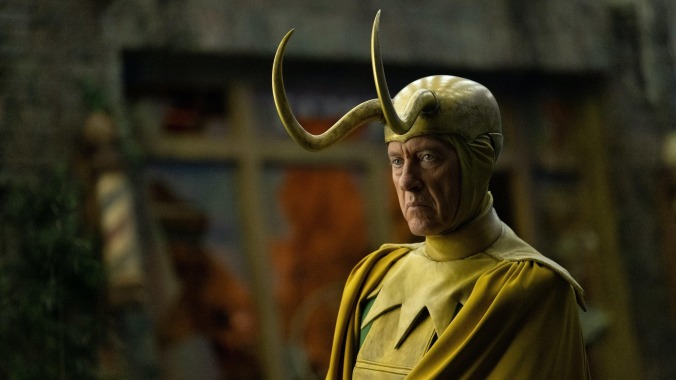Who is Loki’s “man behind the curtain” and what does it mean for the fate of all Lokis?
Loki's "Journey Into Mystery" has, once again, changed everything we thought we knew about time


This week’s episode of Loki, “Journey Into Mystery,” saw the eponymous God Of Mischief (or is he the God Of Outcasts?) heading off into The Void, an endless wasteland at the end of time where the TVA has been dumping all of its garbage (which, coincidentally, was sort of a plot point on Hulu’s M.O.D.O.K., though in that show the titular character was actually dumping his trash into Asgard). Our hero wasn’t alone, though: As covered last week, he was joined by a squad of other Loki variants, specifically the traditional comic book-y Classic Loki (Richard E. Grant), the surprisingly violent and capable Kid Loki (Jack Veal), the Thor-like Boastful Loki (DeObia Oparei), and the eat-your-heart-out-Baby-Yoda adorable Alligator Loki (who may not be a Loki at all, but he is at least green). Those Lokis introduced our Loki to Alioth, a giant and hungry smoke monster who is not the Fantastic Four: Rise Of The Silver Surfer version of Galactus, though that would be one hell of an Easter egg—even better than the Thanos Copter, Frog Thor, the Polybius machine, and the USS Eldridge.
Together, the Lokis hunkered down in a secret Loki lair to share origin stories and explore how they differed from the Loki of the TVA’s so-called “Sacred Timeline.” While it was interesting to hear that Kid Loki is the de facto leader of the team because he actually managed to kill Thor, and that Classic Loki believes his magic is more powerful than the awesome knives that other Lokis prefer (a nod to Loki’s original status in the comics as a magical trickster rather than a guy who loves literal backstabs), the most surprising reveal was that all Lokis, no matter who they are or what timeline they come from, are apparently always destined to die at the hands of Thanos. Diverting from that, or at least diverting early enough in such a way that it won’t happen, is what makes a Loki a variant.
What does this mean for all of time and space?
This has weird and confusing implications for reality, and it suggests that things are more complicated than the one straight line with branching paths that the TVA uses to represent the Sacred Timeline. The straightforward explanation is that the Sacred Timeline is the one that we’ve seen play out in the Marvel Cinematic Universe movies, which would mean that a Loki who is an alligator is automatically a variant because… he’s an alligator. But, Richard E. Grant’s Classic Loki revealed in this episode that he went through all of the same stuff as Sacred Timeline Loki, but rather than trying to fight Thanos when he came to collect the Infinity Stones, he used magic to fake his death and hide on a remote planet. The TVA didn’t have a problem with him wearing a different costume or favoring magic over knives, and it wasn’t until he got lonely and decided to go see what his brother was up to—reintegrating himself to whatever was happening in the larger universe—that the TVA came for him.
So, in theory, if everything had happened correctly to Alligator Loki, and he failed to take over Alligator New York and eventually got killed by Alligator Thanos when he tried to assemble the Alligator Infinity Gauntlet, that would’ve been the Sacred Timeline version of Loki. The implication is that the original Loki we know is only the original Loki we know because he’s the one who followed the path that the TVA wanted, and not that he’s the “correct” version, which suggests a level of control and manipulation that the TVA has so far been trying to hide. In other words, they’re not protecting a certain series of events, they’re orchestrating a certain series of events.
So what does this have to do with Alioth?
Alioth is clearly protecting someone, since the final moments of this episode of Loki reveal a portal to some kind of space-mansion, and that someone is presumably the person who has been pulling the strings this whole time—the “man behind the curtain,” as Ravonna Renslayer (Gugu Mbatha-Raw) calls him. Here’s where things potentially get very spoilery: In the comics, Alioth is an unknowable cosmic force who lives outside of the bonds of time and eats time energy, a lot like he does in Loki, which makes him the natural foe of noted Marvel Comics time traveler Kang The Conqueror (a potential post-Thanos villain for the MCU). Kang could be the man behind the curtain in the space-mansion, especially since Lovecraft Country’s Jonathan Majors has been going around telling people he’s playing Kang in Ant-Man And The Wasp: Quantumania. But, just like the off-base predictions that the real villain in WandaVision would be Mephisto—a character that MCU fans would have no context for—it seems very unlikely that the big bad guy in Loki is going to be someone we’ve never met (even if you just look at it in terms of crafting a satisfying narrative).
I said this in my predictions last week, but it really seems like the most likely person to be running the show is Loki himself (or at least a Loki). We know that whoever secretly runs the TVA has manipulated events to allow all of this specific stuff to happen, from Loki failing to take over New York, to Thanos killing Loki, to the Avengers going back in time and accidentally creating a variant branch where Loki escapes, which means it stands to reason that the man behind the curtain wanted Loki and Sylvie to get to the space-mansion. Maybe they’ll find themselves inside? Maybe it’ll be empty and they’ll realize that they’re the ones who have to go back and make sure everything happens the way it’s supposed to? Loki is a liar and a trickster, so if all the evidence is pointing at one thing, wouldn’t it be safer to assume that the truth is absolutely anything but that one thing?